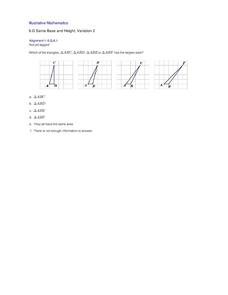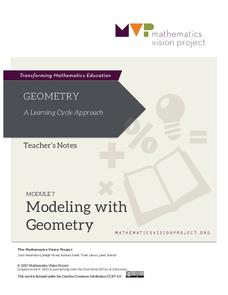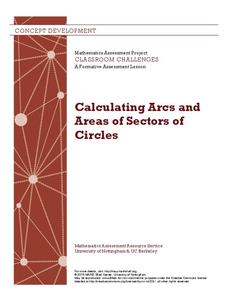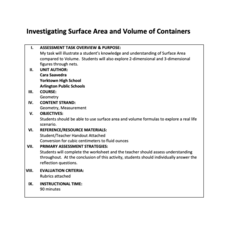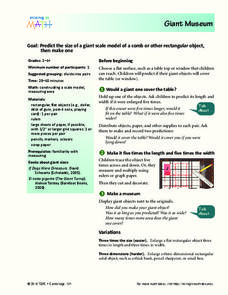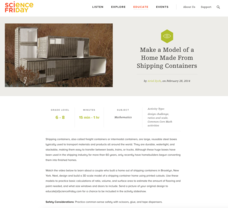CK-12 Foundation
Factorization of Quadratic Expressions: Algebra Tiles
What does it mean to factor the difference of two squares? The interactive presents an area model of the difference of two squares. Pupils rearrange the model to create a rectangular area. The learners determine the length and width...
Texas Instruments
Finding Linear Models Part III
Explore linear functions! In this Algebra I lesson, mathematicians graph data in a scatter plot and use a graphing calculator to find a linear regression and/or a median-median line. They use the model to make predictions.
Kentucky Department of Education
Multiplication Grade 3 Formative Assessment Lesson
Guide multiplication lesson plan instruction with a formative assessment. Mathematicians are given two multiplication problems to solve and represent using the area model, equal groups, repeated addition, and word problems. Following the...
Illustrative Mathematics
Equal Area Triangles on the Same Base II
A deceptively simple question setup leads to a number of attack methods and a surprisingly sophisticated solution set in this open-ended problem. Young geometers of different strengths can go about defining the solutions graphically,...
EngageNY
Grade 5 Math Module 1, Topic E, Lesson 11
Let your understanding of multiplying decimals flourish and multiply. After briefly reviewing place value concepts and how to add and subtract decimals, scholars learn to multiply a decimal fraction (like 0.6) by a whole number. They use...
Illustrative Mathematics
Same Base and Height, Variation 2
This is a good model for learners to visualize triangles of the same base and height. They can can begin to comprehend that these triangles will have the same area no matter how the triangle is drawn. It is part of a series of resources...
Mathematics Vision Project
Module 7: Modeling with Geometry
Model good modeling practices. Young mathematicians first learn about cross sections and solids of revolution. They then turn their attention to special right triangles and to the Laws of Sine and Cosine.
Teach Engineering
Discovering Relationships Between Side Length and Area
Consider the relationship between side length and area as an input-output function. Scholars create input-output tables for the area of squares to determine an equation in the first installment of a three-part unit. Ditto for the area of...
EngageNY
Modeling Riverbeds with Polynomials (part 2)
Examine the power of technology while modeling with polynomial functions. Using the website wolfram alpha, learners develop a polynomial function to model the shape of a riverbed. Ultimately, they determine the flow rate through the river.
EngageNY
Perimeter and Area of Triangles in the Cartesian Plane
Pupils figure out how to be resourceful when tasked with finding the area of a triangle knowing nothing but its endpoints. Beginning by exploring and decomposing a triangle, learners find the perimeter and area of a triangle. They then...
Mathematics Assessment Project
Calculating Arcs and Areas of Sectors of Circles
Going around in circles trying to find a resource on sectors of circles? Here is an activity where pupils first complete an assessment task to determine the areas and perimeters of sectors of circles. They then participate in an activity...
Mathematics Assessment Project
Maximizing Area: Gold Rush
Presenting ... the gold standard for a lesson. Learners first investigate a task maximizing the area of a plot for gold prospecting. They then examine a set of sample student responses to evaluate their strengths and weaknesses.
Teach Engineering
Making Model Microfluidic Devices Using JELL-O
Nothing flows like J-E-L-L-O! In the final portion of a four-part series, pupils create scale models of microfluidic devices out of gelatin and bendable straws. They use their devices to test various flow rates in the delivery of...
Curated OER
Area: It's What's on the INSIDE That Counts!
Second graders participate in a series of hands-on, online and multimedia activities that examine the concept of area. They view clips from the animated series Math Monsters and discuss the purpose of area and how it is used in the real...
Howard Hughes Medical Institute
The Great Elephant Census Modeling Activity
They say elephants never forget—and your class won't forget an insightful modeling activity either! Junior zoologists take part in a mock elephant census using the sample count and total count methods. The included materials provide...
EngageNY
Interpreting and Computing Division of a Fraction by a Fraction—More Models II
No more inverting and multiplying to divide fractions. Applying concepts of measurement division from the previous lesson, pupils consider partitive division using fraction bars and number lines. They first convert fractions to like...
Radford University
Next Top Model
Create a world of similar models. The geometry and measurement unit uses real-world scenarios to create models of familiar buildings and rooms. Scholars work with blueprints and scale models to compare areas and volumes between the...
US Environmental Protection Agency
Building an Model Aquifer
With almost half of Americans relying on groundwater supplies, it is more important than ever to protect aquifers from possible contaminants. Working in small groups, young environmentalists explore this problem as they create an aquifer...
Science Matters
Spaghetti Fault Model
Does increasing the pressure between two moving plates provide a stabilizing force or create more destruction? The hands-on lesson plan encourages exploration of strike-split fault models. The sixth lesson plan in a 20-part series asks...
Center for Math and Science Education
Slump Model
Although it appears that this cut-out paper model makes a welcome activity, it is challenging to construct. It displays a square area of a town on a plateau undergoing slump or slope movement. While it is an outstanding model, the time...
Radford University
Lemonade Business - Investigating Surface Area and Volume of Containers
Boost lemonade sales by using the perfect container. For a given volume, future entrepreneurs design a container that will have the least surface area and by extension, the least cost of material. They create a two-dimensional net of...
Curated OER
Gotcha Covered, Pardner!
Young geometers use the interactive website Cyberchase to practice calculating both area and perimeter. Real world problems encourage learners to discover that we use math each and every day.
Curated OER
Giant Museum
Scholars make a giant scale model of an object. They will take a regular item and enlarge it to five times its length and width. They attempt this same concepts with a 3D model.
Science Friday
Make a Model of a Home Made From Shipping Containers
Build a scale model of a home built out of shipping containers. A hands-on activity has scholars watch a video about a home built from shipping containers and then design their own home. They build scale models of their designed homes...
Other popular searches
- Area Model Multiplication
- Fractions Using Area Models
- Probability Area Models
- Multiplication Area Models
- Arrays and Area Models
- Binomial Area Models
- Area Model Fractions
- Area Models and Distribution
- Area Model of Multiplication
- Modelling Local Area
- Area Models Presents
- Mixed Numbers Area Model







